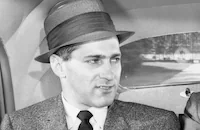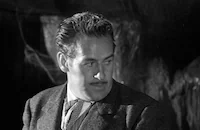Rogue Cop
Brief Synopsis
Cast & Crew
Roy Rowland
Robert Taylor
Janet Leigh
George Raft
Steve Forrest
Anne Francis
Film Details
Technical Specs

Synopsis
In a penny arcade, a drug dealer is stabbed to death by a man who claims the territory for himself. Outside the arcade, the man is briefly detained on a parking violation by patrolman Eddie Kelvaney, but flees before the murder is discovered. With the help of his older brother Christopher, a police detective, Eddie uses mugshots to identify the killer as George "Wrinkles" Fallon. Christopher and Eddie track Fallon to a poker game in an abandoned billiards parlor and arrest him. The following day, Christopher is summoned by mobster Dan Beaumonte, who is at the race track with his alcoholic mistress, Nancy Corlane. Beaumonte tells him that Eddie must not identify Fallon in court, and instructs Christopher to offer his brother a substantial bribe for his cooperation. Christopher, who has been on Beaumonte's payroll for years, demands to know why a small-time criminal like Fallon merits such intervention by the mob, but Beaumonte refuses to answer him. That evening, Christopher meets his brother in a nightclub where Eddie's girl friend, Karen Stephanson, works as a singer. Christopher presents Beaumonte's offer, warning that Eddie will be killed if he does not recant his identification of Fallon, but Eddie flatly refuses to be bought. Karen joins them, and while Eddie is away, Christopher remarks that they met two years ago, in Miami. Christopher then goes to Beaumonte's penthouse apartment, where the crime boss is meeting with his colleague Ackerman. To buy his brother time, Christopher tells the men that Eddie will cooperate, and Ackerman instructs him to bring Eddie by the following night. After Christopher leaves, Beaumonte explains to Ackerman that Christopher keeps an eye on his bookies, collects debts and "settles beefs" for him. Ackerman questions whether Christopher can be trusted in this matter, and Beaumonte agrees to bring in an out-of-town enforcer to hedge their bets. Meanwhile, after making inquiries with a contact in Miami, Christopher calls on Karen and informs her of Eddie's situation, asking her to help by telling Eddie that she needs a large amount of money for an operation. Karen refuses, and Christopher tells her he knows about her past as a mobster's mistress in Miami. The following day, Christopher goes to see Eddie, and they argue over Christopher's contempt for their late father's moral values. Christopher urges his brother to pretend to go along with the scheme and then tell the truth on the witness stand, when the publicity surrounding the trial will afford him some protection. When Eddie mentions that he hopes to marry Karen, Christopher brings up her shady past and Eddie throws him out. At the appointed hour, Christopher goes alone to Beaumonte's apartment, and the mobster angrily fires him, threatening to turn over evidence of Christopher's corruption to the commissioner. Warning the men to leave Eddie alone, Christopher beats up Beaumonte's bodyguard, Johnny Stark, and even punches Beaumonte. When the inebriated Nancy makes fun of Beaumonte, he angrily has her sent to some of his low-life friends. Christopher goes to the nightclub to see Karen, who admits that she is not in love with Eddie. Beaumonte calls Christopher at the club and agrees to give him two more days to change Eddie's mind. Relieved, Christopher again asks Karen for her help, and she agrees to do whatever she can. Late that night, Christopher is awakened when Nancy comes to his door. Nancy, who has been raped by Beaumonte's friends, tearfully tells Christopher that Eddie was shot to death in the street. Leaving Nancy at his apartment, Christopher goes to the police station, where he learns that Karen witnessed the murder. Lt. Vince D. Bardeman suspends Christopher, after informing him that he is under investigation by the grand jury. Christopher admits to being a crooked cop, but vows to catch Eddie's killer, and Vince agrees to keep him on while they work on the case. After getting a description of the killer from Karen, Christopher goes to the newsstand run by his informant Selma, who says that Beaumonte and Ackerman are looking for Nancy. Christopher smuggles Nancy past the police guard into Karen's apartment for protection, and she tells him that Fallon, who used to be a street photographer, has a picture of Beaumonte and Ackerman taken many years ago. Nancy says that Beaumonte paid Fallon a large sum of money, adding that she revealed some of this information to her attackers. Christopher surmises that the photograph must contain evidence of a crime, which would explain Fallon's importance to the mob. Christopher returns to the police station and makes a deal with the district attorney to turn state's evidence on Beaumonte. He then goes to Karen's apartment and discovers that Karen has been taken to the police station and Nancy has been drowned in the bathtub. Christopher returns to the newsstand, and Selma tells him that Eddie's killer is Joey Langley, a hit man from the West Coast. Christopher instructs her to get word to Beaumonte that he is on his way to apprehend Langley. Accompanied by fellow detective Sidney Y. Myers, Christopher goes to Langley's hideout and arrests him. On the street outside, Beaumonte and Ackerman, who have been lying in wait, open fire. The detectives are wounded, and Beaumonte and Ackerman are killed. In the ambulance, Christopher asks Sidney, whom he had once dismissed for his honest principles, for forgiveness.

Director

Roy Rowland
Cast

Robert Taylor

Janet Leigh

George Raft

Steve Forrest

Anne Francis

Robert Ellenstein
Robert F. Simon

Anthony Ross

Alan Hale Jr.

Peter Brocco

Vince Edwards
Olive Carey

Roy Barcroft
Dale Van Sickel

Ray Teal
Guy Prescott
Dick Simmons
Phil Chambers
Lillian Buyeff
Jimmy Ames
Joe Waring
Paul Brinegar
Paul Hoffman
Nesdon Booth

Connie Marshall

Nicky Blair
Richard Deacon
Gilda Oliva
Dick Ryan
Dallas Boyd
George Taylor
Paul Bryar

Russell Johnson
Michael Fox
Milton Parsons

Robert Burton
Carleton Young
George Selk
Benny Burt
Gene Coogan
Mitchell Kowall
Jarl Victor
Crew
Jeff Alexander
Sydney Boehm
Ridgeway Callow
William Dorfman
Cedric Gibbons
A. Arnold Gillespie
Keogh Gleason
Sydney Guilaroff
E. Darrell Hallenbeck
John Logan
Wesley C. Miller
Nicholas Nayfack
James E. Newcom
Hans Peters
Helen Rose
Robert Saunders
John Seitz
John Shugrue
William Tuttle
Finn Ulback
Charles Wallace
Edwin B. Willis

Photo Collections
Film Details
Technical Specs

Award Nominations
Best Cinematography
Articles
Rogue Cop
Taylor takes on the title role, that of veteran police officer Kelvaney, who is not above taking pay-offs from underworld gang leader Beaumonte (Raft). When Taylor's kid brother Eddie (Steve Forrest), an idealistic rookie cop, runs afoul of Beaumonte and is murdered, it becomes clear that the rogue cop and the gangster are on a collision course that only one of them will survive. Leigh, at the peak of her beauty, plays Eddie's girlfriend, a nightclub singer named Karen. Another fetching blonde, Anne Francis, takes the role of Raft's mistress.
Rogue Cop, adapted from the novel by William P. McGivern, has similarities to The Big Heat (1953), based on another story by the same author and released a year earlier. In both cases, a cop (Glenn Ford in the latter film) is led to crack down on a corrupt organization after the murder of a loved one.
Taylor's role allowed the former romantic leading man to have a rougher, more darkly compelling edge than his former studio boss, Louis B. Mayer, would likely have permitted. Taylor's 25-year tenure at MGM, which began in 1934, would be the second longest of any performer in the company's history -- topped only by Lewis Stone, who was associated with the studio for 29 years.
Rogue Cop was Leigh's last film with MGM, winding up an eight-year period in which she played mostly ingenues. "As I walked out that big iron gate for the last time," she wrote in her autobiography, "the flood of memories brought a flood of tears... And I was certain of one glorious gift: A constellation of events had placed me in Hollywood, at Metro-Goldwyn-Mayer, in the twilight of the Golden Years."
Producer: Nicholas Nayfack
Director: Roy Rowland
Screenplay: Sydney Boehm, from novel by William P. McGivern
Cinematography: John F. Seitz
Art Direction: Cedric Gibbons, Hans Peters
Original Music: Jeff Alexander
Editing: James E. Newcom
Costume Design: Helen Rose
Principal Cast: Robert Taylor (Det. Sgt. Christopher Kelvaney), Janet Leigh (Karen Stephanson), George Raft (Dan Beaumonte), Steve Forrest (Eddie Kelvaney), Anne Francis (Nancy Corlane), Robert Ellenstein (Det. Sidney Y. Myers).
BW-93m. Closed captioning.
by Roger Fristoe

Rogue Cop
Quotes
Trivia
Notes
The working title of the film was Kelvaney. William P. McGivern's novel first appeared in Cosmopolitan in April 1954. According to April 1954 Hollywood Reporter news items, Anne Bancroft, Barbara Bates and Margia Dean tested for roles in the film. Hollywood Reporter news items add Roger Etienne, Tommy Herman, Howard McNear and Harry Wolverton to the cast, but their appearance in the final film has not been confirmed. Rogue Cop was nominated for an Academy Award for Best Cinematography (Black and White). Janet Leigh ended her contract with M-G-M after making this film.

Miscellaneous Notes
Released in United States Fall September 1954
Released in United States Fall September 1954














